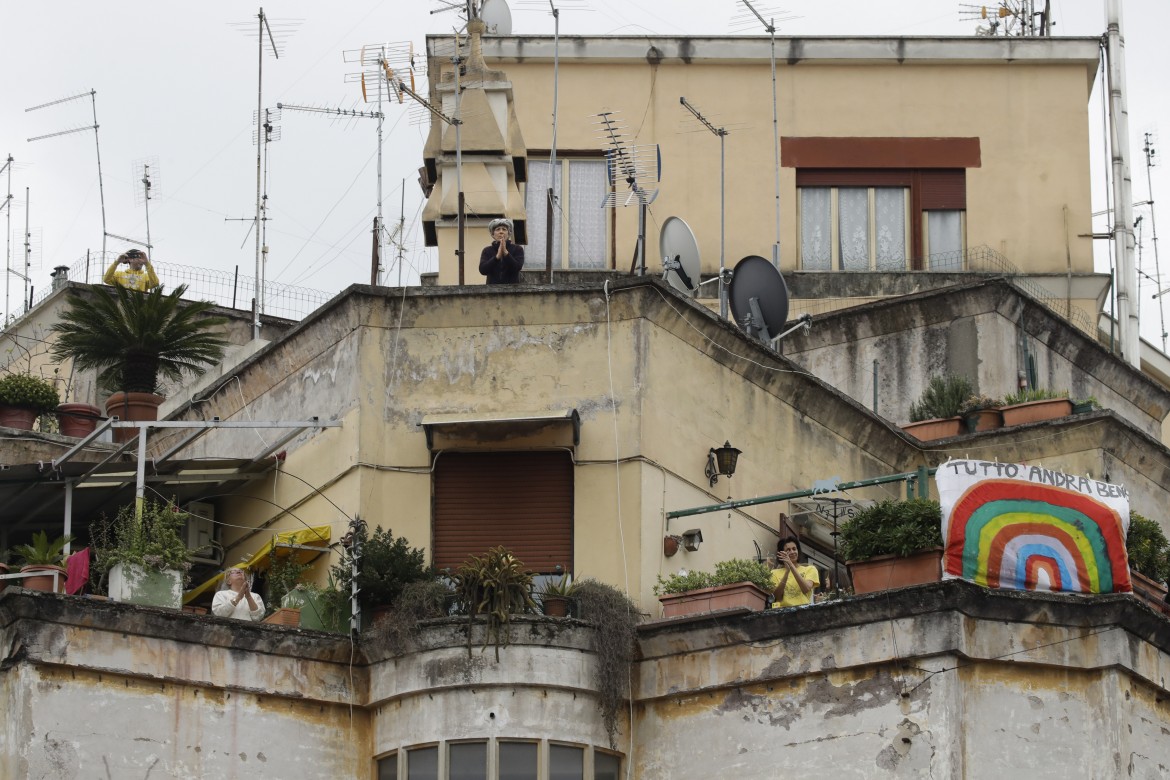Commentary
Open conflict between ‘species consciousness’ and national interests
There is no automatic connection between the emergence of a global danger and the choice for a change, not to mention a radical systemic correction.

The hawks have fallen silent. After the Pavlovian reflex of ECB President Christine Lagarde, which also stirred up their own financial “nests,” now everything is a promise of flexibility, of new liquidity to be injected into the markets.
The devotees of the “black zero,” die schwarze Null, the idol of zero-deficit spending, are now pretending nothing is happening while the Berlin government is preparing to support the German economy and its exports with €550 billion. “An unprecedented measure in the history of post-war Germany,” says Economy Minister Peter Altmeier.
However, everyone hastens to add that the EU institutions approve of this and that “the rules on state aid will not be violated.” This is the point that the guardians of the economic order hold most dear. The pandemic disaster calls for exceptional measures, but must not in any way call into question the rules of operation of the system, which must, of course, be seen as not responsible for the conditions in which a number of countries are facing the emergency now.
With respect to political power, which can use—and historically has used—any state of necessity to reduce the space of democracy to the point of erasing it altogether (thankfully, this does not seem to be the case with our current government, with the exception of a few local would-be strongmen), economic power has every interest in preventing any paradigm shift that would not lead to a further expansion of the accumulation process.
This also explains the continuous wavering and the coexistence of dramatization and minimization. In the worst case scenario (the closest incarnation of which would seem to be those being enacted by Donald Trump and Boris Johnson), the two contrasting demands for change and preservation of the status quo can merge into a single cynical and authoritarian line of conduct.
According to the same logic, nationalist closure does not mean giving up the protection of one’s own global markets. We have seen many examples of this in recent years, and the explosion of the pandemic could even accentuate this toxic mix and cast the inevitable support for the national economic sectors in terms of competition, if not outright trade war.
All the hopes that have been built up due to a renewed “species consciousness,” a surge of global solidarity, the widespread awareness of a common destiny, risk being quickly disappointed and overwhelmed by the “priority of the national interest.” After all, the hesitations, duplicity and selfishness with which the climate emergency has been tackled so far do not bode well for the future.
In short, there is no automatic connection between the emergence of a global danger and the choice for a change, not to mention a radical systemic correction. That is why this time of danger cannot be a time of silence and trusting the establishment. Not even the experts, who, even if they have the necessary knowledge, firmly tethered to empirical data and research results, are often expressing divergent positions, if not outright contradictory—not to mention their predictions, which the most serious of them tend to avoid making altogether.
Predictions are precisely what the very worst of politicians are unfailingly building their fantasies on. This is, for example, the case with Boris Johnson, who, while deciding to keep the measures to stem the contagion to a minimum, is warning British citizens that they will have many dead to mourn.
No one, of course, dares to admit it openly, but it is very likely that the prospect of the disappearance of a good number of elderly, sick and marginalized people excluded from assistance and treatment is very tempting for those who would like to make the social security and welfare institutions “lighter,” thus freeing up resources to be allocated to other more profitable sectors. This cynicism that no one dares confess is perfectly in line with the policies of cutting and downsizing healthcare institutions which have been pursued in many countries in recent decades.
Today, they are to blame for having severely weakened our capacity to respond to the pandemic emergency. And this is not some obscure conspiracy theory, but simply the extreme consequences to which the dogma of efficiency, profit and accumulation leads us. All the more true since the contemporary production systems do not need a very large “industrial reserve army” (and even less so one with weak consumption capacity), so that no epidemic catastrophe would end up favoring the bargaining power of the workers, as happened after their decimation during the plague of the 14th century.
The forms of work mediated by the aseptic and minute-level control of the platforms are now being put forward as guarantors of production at the time of the coronavirus: individuals who are physically separated, connected by the brain of the enterprise and organized according to its purposes.
The quick rise of telework certainly calls for a tele-resistance. However, the freedom of social cooperation, by its very nature, cannot be confined to cyberspace. This must lead us to think “beyond the pandemic” and to try to influence the radically different paths that the current crisis might take.
Originally published at https://ilmanifesto.it/e-scontro-aperto-tra-coscienza-di-specie-e-interessi-nazionali/ on 2020-03-15
